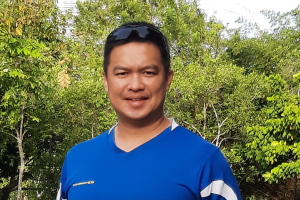Young Children’s Voices in Mathematical Problem Solving
Contributed by Dr Ho Siew Yin and Sng Wei Qin Abbie, from NTUC First Campus, for SingTeach Virtual […]
Read More
Since the pandemic hit, many teachers have reported experiencing burnout and an increased level of work stress. This is not surprising as the COVID-19 situation and current endemic phase has created additional responsibilities for teachers. These include dealing with safe management measures and planning for online lessons during home-based learning days. Four teachers share how they maintain their well-being during these challenging times.
If you would like to share your experiences, please submit them on our Virtual Staff Lounge page.

As a teacher, how do you try to maintain a work-life balance?
Eat a live frog first thing in the morning and nothing worse will happen to you for the rest of the day.
– Mark Twain
I eat the frog. I make a list of things to do for the day and prioritize the ones which are hardest to accomplish. As I tick off the list of things I have completed, it gets easier to get through the day. I go to quiet corners of my school where I can engage in deep work without distractions and interruptions.
I also go on long walks by the beach near my home to maintain a healthy mind and body, to be in touch with how I am feeling and why I am feeling in a certain way. A Stanford University study has also found that walking awakens creative ability by 60%! Taking breaks enable me to be more productive and efficient, and I can get more done with less.
Despite the challenges faced, what is the most satisfying aspect of your job that keeps you motivated?
I am motivated when my students liken Math to Pepsi and “Ask for More” (a tagline used for one of Pepsi’s advertising campaigns). They adopt a craftsman approach to master their work through deliberate practice by asking for more exercises and sessions beyond curriculum time which I would be only too willing to oblige. They take ownership to deepen their learning by asking questions and are enthusiastic about sharing with their peers the methods they had adopted in solving Math questions. My students also show that they are cognitively engaged when they debate about the next appropriate step to take to solve Math problems. Their drive to do well drives me to do well too.

As a teacher, how do you try to maintain a work-life balance?
As the saying goes, “The hardest thing about being a teacher is that it matters every day”. I truly believe that teaching responsibly is about nurturing the child academically, as well as making sure the child is morally upright. This belief strongly influences the way I go about my work.
Maintaining a work-life balance is often a challenge for teachers. Teachers understand when we talk about the myriad of tasks we are engaged in daily. Marking and other administrative tasks are often “packed” for home. The COVID-19 situation has only made it more challenging. Regardless, many teachers go on because they believe in what they do.
To maintain physical and mental well-being, I do a few things. On a daily basis, just before the rush of the day, I would spend 5 minutes reflecting on things I am grateful for. I developed this habit after reading Shawn Archor’s book “The Happiness Advantage” (a recommended read). This is an important exercise for me as it keeps me positive and reminds me that I am blessed.
When at home, I make sure to apportion time (usually between 6.00 pm – 8.30 pm) for myself and my family. This time is sacred to me. Any work that needs to be done, will be done after 8.30 pm. It is a blessing that my wife is a teacher as well, hence, we are able to better understand each other.
During the weekends, I attempt to leave work aside. I spend the weekends cycling (my hobby), eating at interesting new places and having quality time with the family. I feel that the concept of work-life balance is a personal mental construct. Every individual will need to find his or her balance. What works for one, may not work for another.
In summary, I maintain a work-life balance by
Despite the challenges faced, what is the most satisfying aspect of your job that keeps you motivated?
There are many aspects of teaching profession that have enabled me to remain in it for so long. However, the one that provides me with the greatest fulfillment would be viewing my role as a developer and influencer of young people, enabling them to become thinking and morally upright adults.
To be ready to face the challenges ahead, our students must not only be equipped with the subject-content knowledge, but they also need to be taught to discern between good and bad.
As a teacher, I feel that I have a direct impact on the development of my students in these areas. Knowing this reminds me daily that my job matters. It not only matters to my students but it matters to Singapore as a whole since my students will be the future of Singapore. I get a good night’s rest knowing that I have invested and contributed to the future of my students and Singapore.

How has the pandemic affected your mental health?
In the busyness of the school term, there was a tendency for the stresses of the pandemic to insidiously creep in. These include the uncertainty of catching COVID-19, supporting students who were affected emotionally from the stresses they experienced at home, and familiarizing with the changes in home-based learning and safe management measures.
In school, one impact was the strain of engaging the students in big classes whose energy was not expanded by the variety of activities which pre-pandemic afforded – including group work, learning journeys and activity-based CCA. The constant need to think and plan for classroom activities ended with my mind not being able to switch off from work even after school hours.
It was not uncommon for colleagues to ask one another how we seemed more busy and tired in spite of not having to plan for learning journeys and level programmes.
What are some of the coping strategies you find useful?
I look for both internal and external sources of support to cope. Having supportive family members and colleagues has been a blessing. School leaders who understood the stresses have also been encouraging and they organize workshops on mental health every term to remind us about self-care.
Being able to support students from vulnerable families through the school’s HOPE@SGS Programme (I was part of the team that secured sponsors to provide necessities and meals for students from vulnerable families and planned programmes for them), has also given me purpose during the pandemic period.
Finally, during the weekends, I create space for self-reflection and allow myself to acknowledge my emotions through drawing and journaling. This helps me to recharge and start each week feeling refreshed.

How has the pandemic affected your mental health?
Different individuals manage disruptions to their lifestyles uniquely. The pandemic brought unprecedented changes to our lives, and this affected us extensively due to its length, its extent and the uncertainties that came along with it. As a secondary school teacher and a parent of two primary school going kids, the initial wave of change brought about by the COVID-19 Circuit Breaker affected me in ways I never expected.
Having a busy schedule as a middle manager, I had found an equilibrium of work-life balance prior to the pandemic. My fitness regime and social activities revolved around my children’s extra-curricular activities. I visited the gym in the same building as my children’s enrichment centre and played badminton regularly with a social group while my children are at badminton training. Circuit Breaker spelt the end to all these. There was no more “me” time, no more fellowshipping with fellow racket rattlers. Work, play and tending to the kids were confined to the home.
This poem describes it best:
Dawn, noon and dusk….
They revolve around the same chores and tasks,
The vicious cycle was as certain as the sun,
My mind screamed, “I buay tahan*”.
*A colloquial term that means “intolerable”.
What are some of the coping strategies you find useful?
To stay mentally, physically and emotionally healthy, I analysed what activities are essential and how I could replace them. I realized that I find calmness when I expend my energy through physical exercise so I channeled my creativity to designing high intensity interval training (HIIT) regimes using disposed car tires and agility exercises using cones. As I love food but dining out was prohibited, I experimented on dishes from other cuisines. Some were successful, and some were a subject of laughter for the entire household.
I tried not to dwell too much in the negatives of the pandemic, but to look for possibilities and opportunities. Not to be too fixated towards what we cannot do, but to explore what we have not tried. As restrictions eased, skating at night up and down Orchard Road and along Singapore River became a regular fixture on weekends as there are less pedestrians. At times when my children skated with me, I took the chance give them a guided heritage tour explaining the colonial buildings in the civic district and the importance of the Singapore River to modern Singapore. While we cannot travel or entertain ourselves at cinemas and fancy restaurants, Singapore still has a lot to offer. The Internet offers us ideas on where we can poke our nose into next.
In all, coping is about cognitively reappraising our purpose in life and what is truly important to us, before seizing opportunities to accomplish them and enjoy the pleasures of life.
Subscribe to our newsletter to receive the latest information about our articles and events. Email us at sgteach@nie.edu.sg for assistance.
On topics related to teaching and learning, we invite you to contribute articles that focus on the following:
We welcome contributions that explore how educators are shaping the future of learning in a rapidly changing world marked by technological advancements and global challenges.
If you have a classroom or education research story to share, we invite you to send in your contribution articles.
Submit your contribution here:
SingTeach complies with the Personal Data Protection Act 2012 of Singapore
For questions, please contact the editorial team: sgteach@nie.edu.sg
